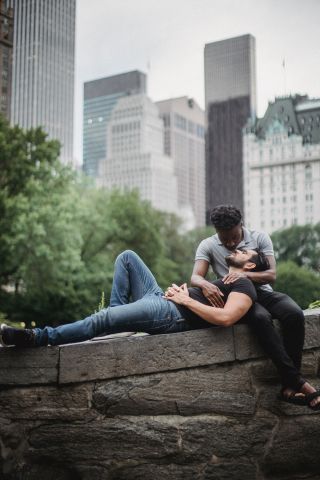Sexual Orientation
How Homophobia Harms Relationships
Bias affects same-sex couples in a variety of ways.
Posted July 27, 2023 Reviewed by Gary Drevitch

Homophobia is real and affects the relationships of LGBTQIA+ couples. I recently received a message from a reader calling me sick and attempting to shame me for a photo of two men kissing I included with a post. It reminded me of the challenges many of the couples I meet face on a daily basis. I’ll keep featuring these photos and bringing attention to how comments like this cause harm.
When we look at research on same-sex couple relationships, such as John Gottman’s studies, it’s found that the problems are fundamentally highly similar to those of heterosexual couples. One big difference, though, is discrimination faced from others — perhaps including lack of family support, prejudice, and nasty comments made by strangers on the street or on the internet. This creates external issues for a relationship that often develop into internal ones.
Imagine, on top of normal relationship conflict issues, that you are also dealing with one partners’s family (or both) being unsupportive of the relationship because of your sexual orientation. It often leads to no-contact decisions, which themselves can create a lot of hurt, anger, and resentment. This can create tension around holidays and being around any other family members. Such isolation can cause additional conflict between partners especially when they struggle with handling big feelings.
A normal activity such as walking to a coffee shop or posting a picture together can turn into a hurtful or scary experience when a stranger (or relative) makes a nasty comment. Hate crimes against LGBTQIA+ people occur daily. Just a simple comment like the one I received on my post It can raise a lot of fear. When someone feels confident enough to say something hateful, they may also feel confident enough to escalate things. In fact, this is why many couples I work with have conflict over public displays of affection. Holding hands in public is something so simple that many couples take it for granted. LGBTQIA+ couples, though, may feel the need to look around before grabbing their partner's hand or discreetly do it under a table.
Prejudice against same-sex couples is still present today. Many teachers have been told not to tell their students their partner’s gender when the children ask if they are married, due to parental or community bias and complaints. People have been let go from their jobs when their sexuality was discovered; many employment opportunities are missed because of prejudice as well. This adds stress on a relationship and broadens the issues couples must navigate together.
Pride month may have ended, but allyship should happen all year. Being there for those you care about and recognizing the discrimination they endure can support them as they go through it. If homophobia is affecting you or your relationship reach out for counseling to get some support.
To find a therapist, visit the Psychology Today Therapy Directory.
References
Gottman J., R.Levenson. Observing Gay, Lesbian and Heterosexual Couples’ Relationships: Mathematical Modeling of Conflict Interaction (2003).


